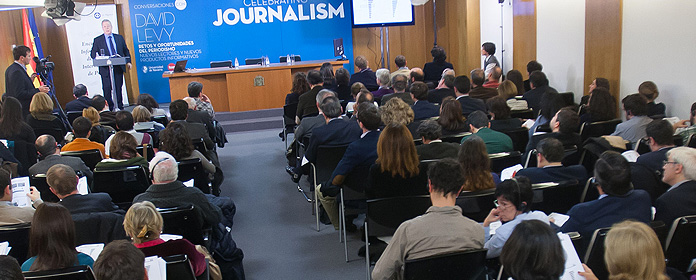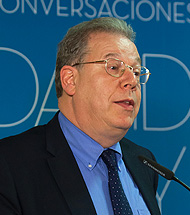Quality, independence and specialization, keys to a necessary journalism
25 communication professionals celebrated the day of the journalists' patron saint with optimistic and realistic proposals to face the challenges of the profession


The future of the media, the crisis and the challenges were the three words core topic of the II Edition of the Conversationsa meeting by journalists for journalists organized at the International Press Center of Madrid(CIP) by the School of Communication of the University of Navarra.
David Levy, director of the Reuters Institute for the Study of Journalism at the University of Oxford, who presented the Digital News Report 2013In a video, different professionals presented "their contributions to overcome the economic crisis and model of journalism, proposing improvements, challenges and lines of work, to move forward without wasting more time looking backwards," according to Monica Herrero, dean of the organizing School .
In the meeting, which remembered Manu Leguineche, the two most repeated words were quality and future. Oskar Belategui, from El Correo, said that "quality is what prevails and the status obliges us to excellence in the work". And that quality has a lot to do with trust, as Ricardo Villa, from RTVEWe must especially preserve the brand, because in the end credibility is what you have".
Giving confidenceQuality and credibility are achieved by understanding that "immediacy and rigor are combined by contrasting," said Javier Nieves, from Cadena 100. Cadena 100said, while Javier García de la Vega, from Antena 3pointed out that "the specialist journalist, the expert, is the profile that public opinion demands".
Maintaining and enhancing quality also requires facing the challenges of a multimedia scenario, as highlighted by Javier Errea of the Society for News Design. Society for News Design (SND): "you have to choose what you want to be, what makes you valuable, exclusive and indispensable, and through which channel to transmit it".
Rosalía Lloret, of the association European Online Publisherssaid that "journalism is not in crisis, it is more alive than ever". Perhaps what is most urgent in the sector is what Ana Bueno, from Mediaset, demanded. MediasetWe must realize that it is not us who are changing, but those who are on the other side: the consumers of information and entertainment. Rafael Sahuquillo, from Radio Marca, pointed out that "the future of journalism lies in multimedia newsrooms".
There was also talk of "independence", "conditioned by the large corporations that have weight in the media", according to Daniel Toledo, from El Confidencialand for respecting the veterans, since "to do without them is suicide", according to Carmen Enríquez, president of the International Press Club.
Regarding the future of the profession, Carmen del Riego, president of the association of the Madrid Press Associationsaid that "it involves recovering the contents, which are the essence of the profession". José Manuel González Huesa, of Servimediacalled for "analytical journalism, which is what is triumphing in the world". Along the same lines, Javier García Vila, director from Europa Pressemphasized "interpretation" and for that "journalists with experience, experience, human and intellectual value" are needed.
Olga Pereda, from El Periódico de Cataluñaconsidered that "professional journalism has to make a difference with citizen journalism". In any case, as highlighted by Manuel Erice, of ABCManuel Erice, of ABC, stressed that "the old spirit of the journalist is needed, with curiosity, training, analysis and specialization".
Fátima Iglesias, from Antena 3, was optimistic and pointed out that information, opinion and research are very good: "we must overcome the complexes we may have had". Iglesias was pleased to note "a rebound of advertising on TV".
Payment for contentThe analysis of the new models was also the subject of analysis in this second edition of Conversations. Carlos Gosh, from EFEsaid that "after giving information for free, making people pay now is complicated, but it is the model that all the media are going to explore". Juan Carlos Laviana, of El Mundosaid that "the financing of serious general information newspapers depends on payment" and Fiona Ortiz, from Reuters, considered that payment for content "will work for some media. There are reputable media that can charge for their content on the web, but I think they will be very few, and the other media will have to find a way to finance their content on the web".
Ana Ormaechea, from TabletArmysaid that "the much smaller Structures are more elastic and more agile", which is an open door to innovation and journalistic entrepreneurship.
Media and networksWith respect to the field opened by social networks, Mario Tascón, from Prodigious Volcanopointed out that "the main front page is starting to be Twitter, it has the form of a timeline and a different reading model ".
On the influence of the networks, Nacho Labarga, from Marca.com and from Quality Sportstressed that "it is fine to measure the impact on social networks, but a medium cannot be mortgaged for the sake of what people will say". On this issue, the most categorical was Carmen Pérez de Armiñán, dean of the School of Information Sciences at the UCM, who pointed out: "Are we trying to say that the information that surfs the networks is journalism? I refuse to say such a thing. If there is no journalist to analyze, to explain, the rest is pure chance".
Finally, Ramón Salaverría, from the School of Communication of the University of Navarra, said that "the fundamental qualification of a journalist is of an intellectual nature, not instrumental skills. It has to do with his or her knowledge of people and the world".
I Contest #celebratingjournalismThe dean of the School of Communication, Mónica Herrero, closed the event by inviting to continue this collective reflection through the I #celebratingjournalism Contest that is aimed at school and university students, who will be the protagonists of the journalistic profession in the future.
